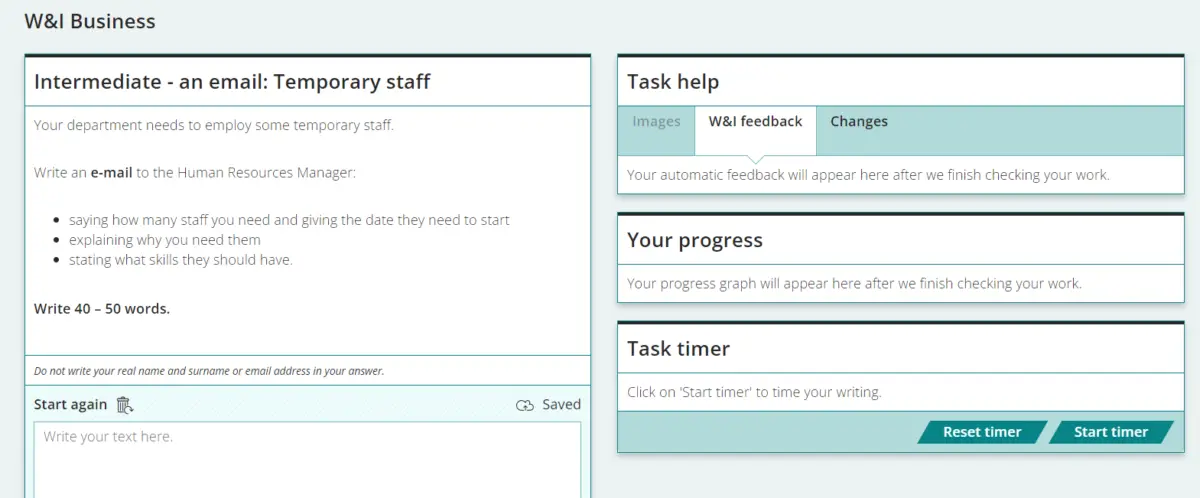Writing is one of the most important skills you’ll learn in English. It helps you stay in touch with friends and family, conduct business professionally, and communicate with the wider world online.
But there are lots of elements to consider when you learn English writing, including:
- The English alphabet
- Grammar
- Spelling
- Punctuation
- Capitalization
- Abbreviations
- Symbols
- A broad vocabulary
- Syntax variation
- Specific formatting for letters, essays, etc.
In this article, we have lots of advice, tips, and free resources to help you improve your English writing skills in all these areas. We’ll also explain how to avoid common mistakes in written English.

10 Quick tips for learning to write in English
If you’re short on time and just need some quick inspiration for ways to improve your English writing skills, here are some tips:
- Create a word list in a notepad or on your phone, and add to it every time you encounter a new word. Look up the meaning when you can, and practice using these words when you write.
- When browsing social media, don’t just ‘like’ a post but also write a short comment in English.
- Have fun with some word-based games for learning English, many of which are free to play online.
- Start keeping an English diary or journal. Every day, write about your day or a topic that interests you. Write about your plans to practice using the future tense.
- Join a language exchange app where you can exchange messages with other learners.
- Use a writing correction tool like Grammarly so you can spot mistakes as you write and learn from them.
- Alternate between handwriting and computer typing so you get used to both and don’t become too reliant on electronic aids.
- Learn about easily confused words in English to avoid common mistakes.
- Refer to a thesaurus to avoid using the same word repeatedly, or to check for other words that might be a better fit.
- After writing something, read it back to yourself out loud to see how it sounds and to double-check for mistakes.
Tools and resources to improve your English writing
Next, we have some recommendations for apps, websites, and English writing courses that will help you become a better writer:
Websites
- 750 Words: If you want to make a habit of writing in English, this site gives you a platform to write privately and track your progress. Collect points for consistently writing 750 words per day.
- Write & Improve: This Cambridge University resource lets you complete writing assignments at different ESL levels. You receive instant feedback and can edit your response to improve your score.
- TheFreeDictionary: An online dictionary and thesaurus that displays definitions and word lists from several mainstream dictionaries in one place.
- Writer’s Digest: An excellent collection of resources to help you write better fiction, nonfiction, and poetry – and even get your work published.
- Write to Done: Tips and inspiration for writers, whether you’re working on a blog, a novel, or short stories.
- Proof It!: An online word game that involves identifying and correcting errors. Good for improving your proofreading skills!
- Knoword: This online game tests your vocabulary knowledge by showing word descriptions. Select Quick Play for random words, or create your own collections of words you want to learn.

Apps
- Grammarly: A writing correction tool that works on your phone or computer to correct mistakes and offer improvements as you type. Free and premium versions are available.
- Hemmingway: Helps you improve your writing by highlighting hard-to-read sentences and unhelpful words.
- Night Zookeeper: One for any kids learning English (although adults can have fun with it too). Create your own characters and then write stories about them.
- Lists for Writers: As the name suggests, this app has lots of helpful lists for writers; from plot ideas to character traits to action verbs.

English writing courses and lessons
- English writing courses on Coursera: Most of these courses are free and last between 1 and 6 months. They are provided by top universities and cover a range of writing skills.
- English Writing Skills course on Udemy: For a low one-off fee, get lifetime access to this course with 44 lectures and 7 downloadable resources. It covers processes, techniques, and formal writing style.
- Private classes with British Council: Sign up for private online classes and get one-on-one help from an English tutor.
Working with a tutor can be particularly helpful as they can set you writing assignments and give you personalized feedback on each one. This kind of guidance is far more helpful than a spell-checker and probably more detailed and honest than you’d receive from a friend or colleague.
However, if you don’t have the budget for private lessons, then the pre-recorded courses from Coursera and Udemy are a great starting point.

How to improve your English writing – a spectrum of knowledge
Being able to communicate well in written English requires a combination of knowledge and skills from different areas. Simply knowing a lot of words is not enough; you must understand the grammar rules that place those words together in cohesive sentences. And a complex sentence can be difficult to read if it lacks the appropriate punctuation marks.
Your approach to writing in English will vary depending on the type of writing you need to do. Creative writing, essay writing, and business writing are all quite different, for instance.
With this in mind, let’s look at some of the main areas that will contribute to your writing progress:
Developing a broad vocabulary
A robust vocabulary enables you to communicate ideas precisely and clearly, adding more life to your descriptions and narratives.
One of the best ways to learn new words is to read a wide variety of different materials. Whenever you encounter a new word, write it down in a notebook, make a note of the context, and look it up in an ESL dictionary. Then, practice using these new words yourself until they become part of your natural vocabulary.
You should also read about commonly abbreviated words in English.
Our guide to learning new English words has more helpful tips on this topic.
Structuring sentences well
Grammatically correct sentences are a basic requirement of good writing, but there is more to it than this. Effective writing uses a variety of sentence structures to keep the reader engaged and avoid sounding repetitive.
Familiarize yourself with the four sentence types and then practice using them in your writing, adding transition words to help you form compound and complex sentences.
We have a separate guide to learning English grammar with resources for different levels.

Mastering punctuation and symbols
English punctuation is something you don’t have to think about when speaking, but it’s an essential part of writing.
If your native language uses the Latin script then you are probably familiar with many of the symbols and punctuation marks used in English, as well as capitalization rules. However, if you’re used to a different alphabet, this brings extra complexity to learning to write in English.
In any case, you shouldn’t assume that everything is used the same way as in your native language.
For example, if you are from a European country, you may be used to placing the currency symbol after the value and using a comma as a decimal separator: 53,60€. But in English-speaking countries, the symbol comes before the value and we use a point separator: €53.60.
Reading to write
When you read, you are reading someone else’s written work, so it makes sense that this can improve your own writing.
Reading different kinds of materials exposes you to interesting writing styles, new vocabulary, and varied sentence structures.
Practice reading from several of these sources each week, and appreciate how the different styles of writing serve different purposes:
- Blogs about topics that interest you
- Opinion articles from newspapers (The Guardian and The Washington Post are free to access)
- Poetry
- Books for learning English
- Subtitles on your favorite English movies or TV shows
- Biographies of people who inspire you
- Novels
- Reviews of movies you want to see
- More English learning topics on Improving Your English!
Writing exercises
If you want to practice your writing but aren’t sure where to start, here are some simple exercises you can try by yourself or with other English learners:
- Read a news article and then summarize it in your own words in writing.
- Practice freewriting; a technique where you start writing about anything at all and continue for a specified amount of time (e.g. 10 minutes), not worrying about correctness but just letting the words flow.
- Translate a song or poem from your native language into English.
- Write a to-do list in English.
- Practice descriptive writing by choosing an object, person, or scene and describing it in as much detail as possible.
- Write a letter (or email) to a friend or family member.
- Take a short piece of writing and re-write it in a totally different style.
- Practice using some of the new words from your word list by writing a short story and including 5-10 of them.

Overcoming common writing mistakes
As you learn how to write English, you are bound to make some mistakes. Even the most competent native English speakers aren’t perfect!
Here are some common writing errors to be aware of:
Vague pronoun references
This problem occurs when a pronoun could refer to more than one subject.
For example: “When Kevin saw the mouse, he ran away in fright.” Does ‘he’ refer to Kevin or the mouse here? It’s unclear.
We could fix this by saying “Kevin ran away in fright when he saw the mouse,” or “When Kevin saw the mouse, it ran away in fright.”
Another example: “Mum and dad told the kids they were having pizza for dinner.” Who is having pizza? Mum and dad? The kids? All of them? Again, the pronoun usage leads to ambiguity.
Run-on sentences and fragments
A run-on sentence contains two or more independent clauses that are not properly connected.
For example: “She was late to work, she forgot to set her alarm.” Two independent clauses cannot be joined by a comma. This mistake is known as a ‘comma splice’. We can fix it by using a semi-colon instead, or joining the clauses with ‘because’.
A sentence fragment is a string of words that is missing an essential component and therefore does not form a complete sentence.
For example: “After the party, which was at Jared’s house and finished around 2am.” This sentence is missing information about what happened after the party.
This guide has more information about both of these errors and how to correct them.
Homophones
Homophones – words that have the same pronunciation but different spelling – can be especially problematic in writing.
Here are some common homophones to be careful with:
- Your and you’re
- Its and it’s
- Their, they’re, and there
- To and too
- Affect and effect
- Complement and compliment
- Awhile and a while
Commonly confused words
Even words that don’t sound exactly the same can be easy to mix up. Here are some common examples:
- Advice and advise
- Rise and raise
- Lie and lay
- Continuous and continual
- Attain and obtain
- Purposely and purposefully
- Further and farther
A spell-check tool can help with many of these errors, but you shouldn’t rely on this alone. Every time you correct an error, make sure you understand why what you originally wrote was incorrect. Over time, you’ll learn from your mistakes. You should also sense-check these suggestions, as spell-check tools can sometimes get it wrong!

How to learn English writing for business
In the business world, the way you write can significantly impact how others perceive you. Poorly written emails or website copy may reflect badly on you or your company, whereas good grammar and the right word choice can help you succeed.
Here are some English business writing tips to help build your confidence in this area:
- Learn common business idioms and their definitions so you can understand these phrases when others use them
- Watch some free business English video lessons from Oxford Online English
- Discover more business English courses that cover a wide range of topics for non-native English speakers
- Try some free practice exercises in the Business category on Write & Improve
These resources should help you whether you are working for a company, providing freelance services, or starting your own business.
Why do good English writing skills matter?
After all of this, improving your written English might feel like a lot of hard work! But don’t give up; there are many benefits to learning English writing and plenty of free courses, apps, and online resources to help you.
Being able to write well in English makes you sound more professional and helps you articulate ideas and requests more effectively. It can open up new professional opportunities and help you communicate with a wider community of people.
So, whether you want to use English for work, communicate with friends, or start writing a blog, let this be your motivation to improve your writing skills.
It requires patience, persistence, and practice, but we hope this guide has given you some new ideas and inspiration to help you along the way. Happy writing!



